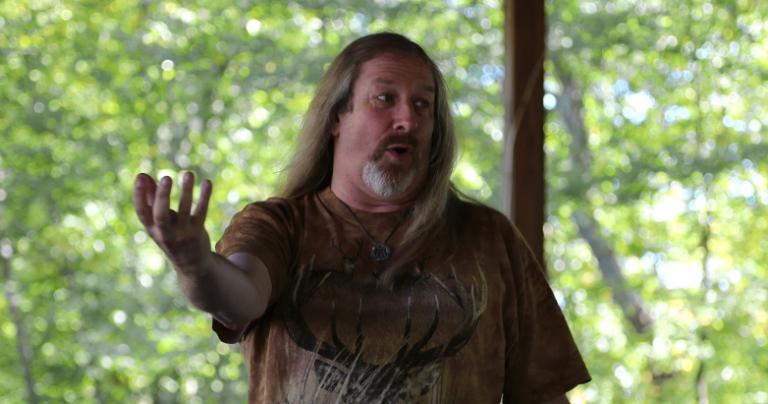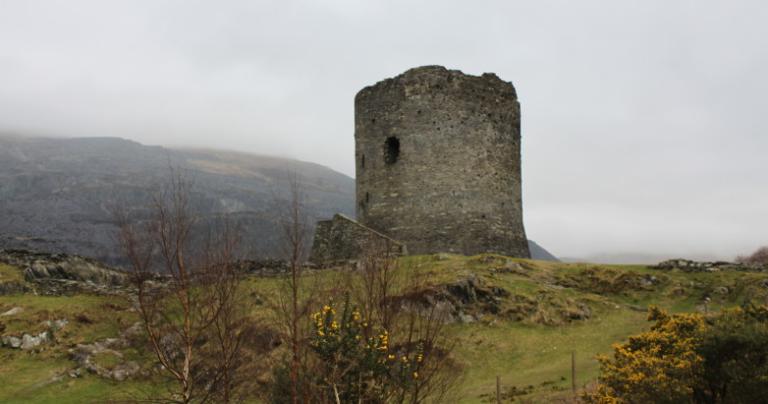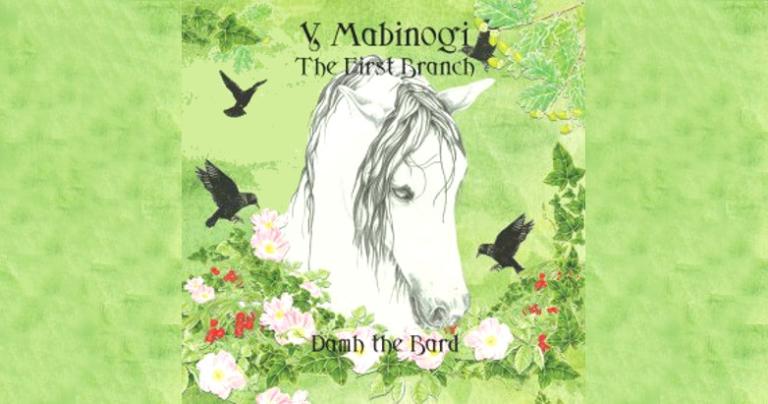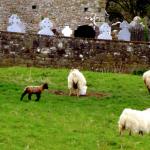Y Mabinogi – The First Branch
by Damh the Bard
17 tracks, 1 hr 39 min
Digital download: £10 ($13.40 at current exchange rates). $19.99 on iTunes.
CD: £15 ($20.10 at current exchange rates)
Any day that has a new Damh the Bard album is a great day. If it’s a double album, it’s twice as good. If it’s a spoken word double album… well, it’s still a great day, but it’s a different kind of great day.
Although the focus of Y Mabinogi – The First Branch is on the stories, it’s not fair to pigeonhole it into the spoken word category. It has songs, but it’s not a music album. It has dramatic performances, but it’s not a radio play. This is a unique work.

Imagine you’re living in Dark Age Britain. Just before dinner there’s a knock on your door. You answer it and find a traveling bard, looking for shelter for the night. Of course you invite him in, because you practice good hospitality. Besides, a happy bard will provide an evening’s entertainment, while a pissed-off bard will trash your name all over the countryside.
You feed him well.
After dinner, the bard unpacks his lute. You and your family gather around the fire, sit back, and listen. The bard plays an instrumental introduction, then starts telling his stories. Occasionally he sings.
This is Y Mabinogi. Damh the Bard takes the role of Pryderi, son of Pwyll and Rhiannon. Most of the album consists of Damh as Pryderi, telling the stories of his parents. Kristoffer Hughes (head of the Anglesey Druid Order) has the first words as a monk reading the opening lines of the story in its native Welsh. S. J. Tucker sings a duet with Damh on “Mother and the Mabon.” And Alan Wheatly-Crowe, a guitarist in Damh’s rock band many years ago, plays guitar on “Who is this Coming?”
But Y Mabinogi is about the stories.
The Mabinogi
The Mabinogi is a collection of ancient Welsh tales. They were first written down in Welsh in the 11th century (thus the appearance of the Welsh monk) but their origins in an oral tradition are much older. The written versions we have are Christianized, but only slightly – their settings and themes are straight out of Celtic paganism.
There are four branches – four collections of tales on the same themes and characters. Think of them as four seasons of an episodic TV show. Or think of the Star Wars movies, which have three branches: the original trilogy, the prequels, and the current sequels.
The first branch of The Mabingoi is titled “Pwyll Prince of Dyfed” and it consists of three stories. The opening story tells of how Pwyll encounters Arawn, King of Annwfn. Pwyll commits a great offense against Arawn, and to atone for it, he takes the form of Arawn and fights an important battle for him.
The second is the story of Rhiannon. She rides by on a horse and no one can catch up with her, until Pwyll calls out to her. Pwyll saves Rhiannon from an arranged marriage she does not want despite his ineptitude, and despite the fact that Rhiannon doesn’t seem to need saving.
The third is the story of the birth of Pryderi. He is stolen from his crib by a monster and to save themselves from criticism, Rhiannon’s maids claim she killed him. As punishment, she is forced to confess her crime to all visitors and offer to carry them on her back, like a horse. Eventually the truth is discovered –Pryderi is returned to his parents and Rhiannon to her rightful station.
The other branches of The Mabinogi are “Branwen Daughter of Llyr,” “Manawydan son of Llyr,” and “Math son of Mathonwy.”
Translation and Interpretation
The oldest documents we have were written in Middle Welsh in the 13th and 14th centuries. There are two complete versions: the White Book of Rhydderch and the Red Book of Hergest, plus other fragmentary versions. None of them are identical, leading literary scholars to conclude they were all copies of an older text.
Y Mabinogi is in modern English – translation was necessary. Damh the Bard read multiple translations, then made his own adjustments. His goal was to stay faithful to the original texts. I read the 1977 translation by Patrick K. Ford some years ago, and when I refer to the tales for rituals or blog posts I usually end up with the on-line version of Lady Charlotte Guest’s 1877 translation.
Y Mabinogi sounded very familiar to me. Damh has repaganized the stories, replacing “God” with “the Gods” and making other small changes that are barely noticeable… because the stories themselves are pagan. He made some stylistic changes to tell the stories from the viewpoint of Pryderi. Other than that, there is very little dramatic license. If you want an authentic version of The Mabinogi, this is about as close as you’re going to get without learning Welsh.

The Performance
I know how to critique music. I don’t know how to critique this, because there is virtually nothing to compare it to. Instead, let me tell you what you will hear on Y Mabinogi.
You will hear the stories of the First Branch of The Mabinogi told by Damh the Bard. Is there a better voice for narrating Celtic tales? Maybe, but I don’t know who it would be. While I’m sure Damh recorded from a script, he never sounds like he’s reading the stories – he’s telling them.
There are five songs, plus two instrumental pieces. Characters don’t break into song like in a Broadway musical – the songs are there to accent the telling of the stories. If the album had been recorded without them it still would be worth listening to – the songs make it better.
The enhancements – Kristoffer Hughes’ Welsh monk, S. J. Tucker’s duet – add to the overall experience but are short enough to not detract from the main purpose of the recording.
The three stories and seven musical pieces are broken up into 17 tracks. The entire album runs 1 hour 39 minutes.
The Future
Damh is planning similar albums for the remaining three branches of The Mabinogi. Here’s what he has to say on his blog:
So the First Branch is done. In a minute I’m going to take off the Rhiannon pendant Cerri made me for this Journey and place it on my altar. I’ll thank Rhiannon, Pwyll, Arawn, and all of the others from the First Branch for their guidance and gift of Awen. I will ask Pryderi to stay with me, and then open to Bran, Branwen, and the energy of the Second Branch, to fill me, be with me, guide me, as I look towards Harlech, and to Ireland for an altogether darker and bloodier tale.
The First Branch took about a year and a half to make. I’m looking forward to hearing the rest in their time.
For those who care about such things, I bought my copy of Y Mabinogi. Damh the Bard is a friend, but my first obligation in a review is to the readers. If I couldn’t honestly say good things, I’d conveniently forget to review it.


















